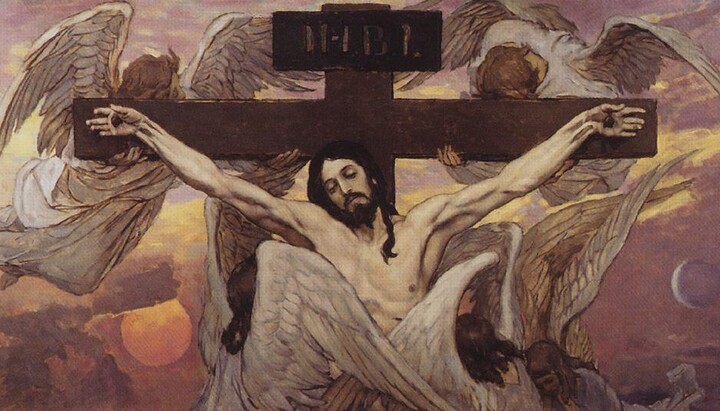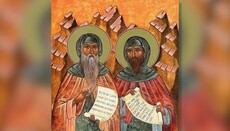The Cross is about us not being fully Christian yet

The Cross of Christ is not just a banner of our salvation. It is also a symbol of what our heart should become.
Why is that? It's very simple. We are not Christians because we are attached to our bodies, health, and the world. Because we think about earthly matters much more than about heavenly ones. Because we fear the future and are essentially slaves to our flesh and sinful minds. If someone reading these lines says, "No, this is not about me. Because all my thoughts are in God, I have no attachments, I worry about nothing, I have not even a shadow of condemnation, and I await my hour of death with joyful anticipation," then I am happy for him. But I cannot say the same for myself, unfortunately.
The Cross of Christ is not just a banner of our salvation. It is also a symbol of what our hearts should become. The Cross is primarily about patience. About unshakeable steadfastness in the most difficult circumstances of life. The road to the Kingdom of God is paved with the cobblestones of patience and nothing else. "If we wish to be proclaimed victors and crowned, we must sacrifice ourselves." St. Isidore of Pelusium.
The Cross is also about personal responsibility for one's salvation. Whether to take it upon oneself or not is our choice. One can bear the cross, or one can run away from it all their life. The Cross is about repentance and prayer and about dying before death itself comes knocking at your door. Dying to everything that ties us to the earthly.
The Cross is about overcoming one's own sinfulness through sincere repentance and prayer, as well as complete renunciation of all earthly attachments and even thoughts of the earthly. If we pray all the time but do not rid ourselves of attachment to the world, we are still far from the practice of the Gospel. To become a spiritual being, one must stop being a slave to one's flesh and sinful mind. "Therefore, if anyone sees that their thought is directed towards wealth and much possession, let them know that this way of thinking is carnal, and let this be a reason for awakening." St. Gregory Palamas.
One who has preserved his soul is someone who is reluctant to part with his attachments, who fears to enter into the struggle for the purity of the soul against the sinful obsession of the mind, who does not even think of renouncing his empty and deceitful thoughts. This is someone who is drowning in sin, like a foolish traveler in a swamp, having chosen the wrong direction.
One who has lost his soul for Christ has forever rejected earthly attachments, fearlessly begun to fight for the acquisition of holiness, bravely opposing the evil that has taken root in him. He has resolutely taken on the task of cleansing his mind from wicked and shameless thoughts and has fervently aimed to attain Divine Love in Christ, thus preserving his soul, like a brave and wise warrior of Christ, joining the army of the Heavenly Father. This is what the famous Athonite saying means: "If you die before death, you will not die when you are dying." For such a person, Salvation becomes the work of his entire soul: "Therefore, it is necessary for him to ascend to the height of the cross, so as not to fall away from the One crucified on it." St. Gregory Palamas.
Behind Christ follows one who has consciously and without any coercion made his final choice: where to go without Christ, if He is the only true God and perfect man? Those who desire Salvation follow Him, voluntarily and with all their hearts entrusting their souls to Him. The main and fundamental rule of this path is to deny oneself. One must completely deny oneself, not partially and gradually, up to the ruthless crushing of one's own sinfulness. If we hope to gain Salvation in the future and meet Christ without trying to do so now, we are still not practitioners of the Gospel.
A practitioner of the Gospel rejects all passions, becomes completely passionless, and begins to live by the Holy Spirit, not considering this an impossible task. A practitioner of the Gospel rejects all worldly desires and finds himself in the world and in the spirit of Christ as in his true inheritance. A practitioner of the Gospel rejects all his thoughts, judgments, and assumptions and thus enters the Kingdom of Eternal Truth, recognizing it as his original abode. He takes up his cross—uncomplainingly accepting all the consequences of his sins for their final and perfect redemption through repentance. He follows the path designated for him by Divine Providence, and thus goes after Christ until he is entirely conformed to Him.
Patience is not passive helplessness or meaningless indifference. It is a deeply conscious acceptance of God's Providence as the wise will of God. Patience must be mastered so that it accompanies us throughout our lives. In patience lies immense strength, like an unbreakable rock, steadfastly standing under the blows of the sea waves. Every aggression, like every storm, dissipates, while patience, like a strong cliff, fearlessly endures all temptations.
If we learn wise patience, it will help us emerge from the limiting circumstances and conditions of earthly life. One who has mastered patience acquires humility as a Divine gift, leading the soul to Salvation. One who has endured earthly life and has carried his cross to the end is saved in the boundless mercy of God: "Cheerful patience in the trials sent by God is the crucifixion on his cross." St. Ignatius Brianchaninov.
Salvation is an indescribable state of consciousness in Christ, transformed by the Holy Spirit. It is an all-pervasive, boundless knowledge of God, which is beyond our limited mental representations. It is identical only to itself and cannot be expressed in the concepts of thought, being in its essence an inexpressible Divine state of consciousness.
Christ, being God and man, suffered on the cross as a man, remaining completely free from suffering as the Divine. By His Honorable Cross, He granted us victory over the flesh and the world, leaving us bodily sufferings and sorrows for our neighbors, endowing us with the eternal freedom of the human spirit, transformed by grace and becoming completely similar to the Divinity of the Holy Trinity. In this lies the great mystery of Salvation and Divine economy.
Salvation is not an escape from earth to Heaven, but the immediate comprehension of God here and now on earth and perfect union with Him. Salvation is the direct comprehension of Truth and liberation from all delusions. "Truth is the undeniable concept of being" (St. Ephrem the Syrian). Salvation means freedom from the world and even going beyond Paradise. Here, the goal becomes not the attainment of heavenly abodes, but complete union with Christ and entry into the uncreated light of the Holy Trinity. "You, Lord, must be sought instead of everything else, and besides You, nothing else should be sought. For whoever seeks You finds everything in You" (St. Ephrem the Syrian).
The world is the abode of ignorance and delusions. Paradise is the dwelling place of angels and holy souls. The world is a cradle for growing in holiness. Heavenly abodes are its indescribable fruit. And the direct task of the Church is to make us heavenly spiritual beings in the fullness of the Holy Spirit, not mortal inhabitants of the earth, attached to the temporary vanity of life. "The Builder of our Salvation leads us, as people grown in darkness, into the great light of Truth, gradually teaching us, sparing our weakness," St. Basil the Great.











